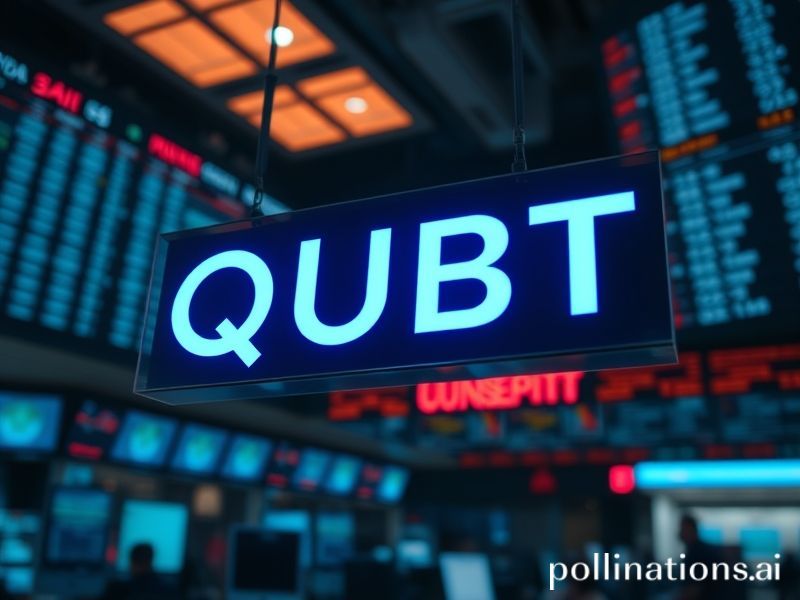QUBT Stock: How a Tiny Quantum Firm Became the World’s Favorite Uncertainty Principle
QUBT Stock: When Quantum Physics Meets Quarterly Earnings, the Universe Shrugs
By the time you finish this sentence, a superposition of QUBT—Quantum Computing Inc.—will have both collapsed into a profit and remained stubbornly loss-making somewhere in Delaware. That, dear reader, is the only certainty left in a world where a company trading under the ticker QUBT can swing 28 % on the mere rumor that a rival in Shenzhen sneezed near a dilution refrigerator.
Let us zoom out, satellite-style, from the fluorescent cubicle farms of Leesburg, Virginia—where QUBT’s accountants valiantly translate qubits into dollars—to the broader planetary farce. From Berlin to Bangalore, governments are flinging cubic hectares of cash at quantum supremacy like drunken sailors buying rounds at last call. The European Quantum Flagship alone has promised €1 billion, China’s 14th Five-Year Plan earmarks comparable yuan, and even Canada—polite, maple-scented Canada—has coughed up CAD 360 million lest it miss the entanglement party. Against that backdrop, QUBT’s $60 million market cap looks less like a company and more like a rounding error in the geopolitical spreadsheet, yet it still manages to magnetize retail traders the way a dropped croissant lures Parisian pigeons.
The international implications? Picture the global supply chain as a nervous Chihuahua on espresso. QUBT doesn’t manufacture chips; it rents time on other people’s dilution rigs—some in Finland, some in Japan, one rumored to be bolted to the floor of a decommissioned Soviet vodka plant outside Novosibirsk. Every time QUBT tweets a partnership with an “undisclosed Asian foundry,” the Chihuahua twitches, freight rates from Busan to LA spike 3 %, and three hedge-fund interns update their macro models at 3 a.m. local time. Multiply by every quantum wannabe from Sydney to São Paulo, and you begin to see why the World Trade Organization now lists “quantum hype spillovers” right after “pelagic fish quotas” in its risk reports.
Meanwhile, the stock itself behaves like Schrödinger’s cat after a Red Bull. On Monday it rallies on news that a QUBT researcher successfully entangled two photons “for slightly longer than last Tuesday.” On Wednesday it plunges when a TikTok influencer points out the firm’s revenue could fit comfortably inside a midsized IKEA tote. By Friday, options volume in Amsterdam eclipses the GDP of Malta, and regulators in three time zones schedule emergency naps.
Human nature, ever the reliable punchline, does the rest. In Seoul, twenty-something crypto expats who once worshipped Doge now genuflect to the Church of Quantum Speed-up, swapping memes of glowing cubes that look suspiciously like stolen Windows screensavers. In London, a boutique wealth manager markets a “Quantum ESG” fund, charging 2 % to hold 80 % cash and the remaining 20 % in QUBT plus a Norwegian salmon-tracking blockchain startup. Clients nod sagely, secure in the knowledge that complexity plus fees equals sophistication.
Of course, the broader significance is that nobody actually needs a commercially viable quantum computer to move markets; they merely need the plausible fiction that one might arrive before the next bonus cycle. QUBT’s latest investor deck features a slide titled “Path to 1000 Logical Qubits by 2027,” illustrated by what appears to be a stock photo of a disco ball. Analysts at Goldman Sachs rate it a “speculative buy,” which in the international language of finance translates to “good luck, pal.”
So where does this leave the planet? In the same place it always is: hurtling around the sun while its inhabitants gamble on electrons they can’t see to solve problems they haven’t defined. If QUBT eventually cracks error correction, the payoff could revolutionize drug discovery, logistics, and cryptography—ushering in either a golden age or the swift collapse of RSA-encrypted everything. If it doesn’t, well, the stock will still have provided a lovely bit of volatility for traders to monetize on their way to whatever fresh mania comes next.
In the end, QUBT is less a company than a global mood ring, flashing colors that map perfectly onto humanity’s twin addictions: hope and leverage. And until the universe decides to observe its earnings report properly, we remain suspended in the usual superposition—simultaneously wealthy and broke, enlightened and deluded, clicking “buy” while quietly praying the waveform collapses in our favor.







